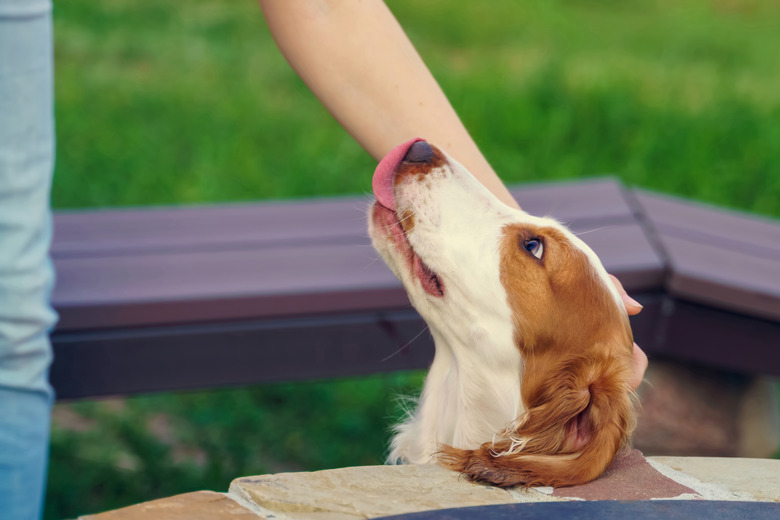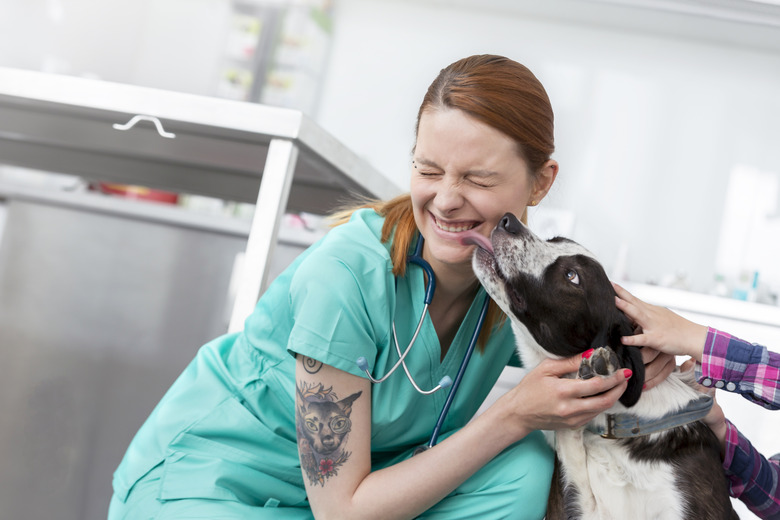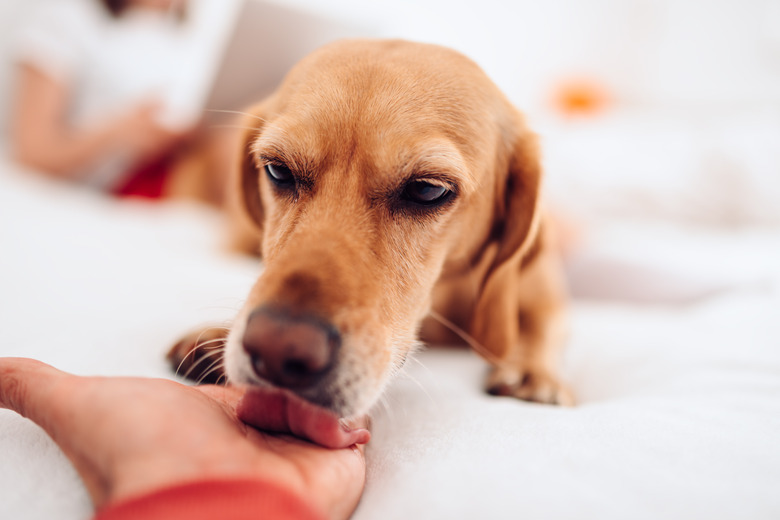Why Does My Dog Lick Me When I Pet Her?
If you live with a dog or have one of your own, you've probably found yourself in this situation before: you come home from work, offer your four-legged friend an affectionate pet and a friendly "hello," only to get covered in a sea of slobber from your hand right up to your face.
Dogs communicate their wants, needs, and moods to us in a number of ways, and licking is just one of the many methods a dog can use to get her point across. So, if you've ever found yourself wondering why your dog licks you every time you reach down to pet her, just know that she's "speaking" to you in one of the only ways she knows how. Exactly what she's saying with those licks will depend on a few factors, including the setting, and possibly, your dog's overall health.
Signs of affection
Signs of affection
Dogs show their affection in a number of ways, and it's certainly not limited to the ubiquitous tail wag or prolonged gaze into your eyes while smiling. Touch is one way dogs express their love for their people and other animals close to them, be that my snuggling up on the couch next to them or even just leaning their body into their legs. Licking is another way dogs can say "I like you" without actually saying it. Dogs tend to lick only those closest to them, and do so in an effort to solidify that bond.
Why dogs lick
Why dogs lick
Dogs are known to lick for a number of reasons, be it themselves, other dogs and animals, or the hands and faces of their favorite human companions. According to the SPCA of Texas, licking is done not only to clean and groom themselves, but the packmates around them. This behavior can be seen among wild dogs as well as domesticated dogs, although the latter may turn to the family cat or even you when offering shared-grooming services.
Additionally, dogs in pack settings will lick other canines in more senior social positions than themselves as a way to greet, show submission, and even beg for food. You've probably seen videos of young wolves licking adults around the mouth who will then regurgitate their fresh kill for the pups to eat, which is believed to be where this current behavior stems from.
If your dog licks you, it's likely a sign of affection, appreciation, or even admiration. We may not offer our own dogs a tongue bath to fulfill their shared-grooming needs, but a friendly and adoring pet on the head, neck, or elsewhere on their bodies can trigger that social aspect most dogs naturally crave.
Veterinarian, author, and professor Dr. Marty Becker explains that licking also releases endorphins in dogs that alleviate stress and can leave dogs feeling comforted or secure. Additionally, it's believed that some dogs essentially train themselves to lick based on our reactions to their licking. Often, when dogs lick a person's hand or face, the person will offer attention to them in some way, either through a laugh, talking, or an appreciative pet.
Of course, licking may be done for less adorable reasons than "my dog loves me!" Sometimes, a dog will lick an open wound on skin in an effort to heal it, while others may just enjoy the salty taste of skin, which occurs especially if you greet your dog after a workout, or pretty much anytime during the hot, summer months.
Excessive licking
Excessive licking
As with most things in life, too much of anything can end up turning into a bad thing, or possibly just something unwanted, like, pulling away an arm drenched in spit every time you reach down to give your dog a pat on the head. In terms of licking, excessive offerings of a dog's tongue can indicate a more serious issue if the licking is chronic and your dog can't seem to stop himself once he gets started. American Veterinarian states that senior dogs who develop behaviors like excessive licking may do so because of musculoskeletal problems, although they usually lick their own joints or feet if this is the case. Dogs who lick people or other animals compulsively may suffer from stress, anxiety, or obsessive compulsive disorder.
Alternatively, some dogs have been shown to lick excessively when they detect a health problem in their favorite person. Dr. Marty Becker goes on to recount a study in which nearly half of the dogs surveyed were able to detect low blood sugar levels in their owners who had Type 1 diabetes. How did they let their people know? You guessed it — by licking their skin.


